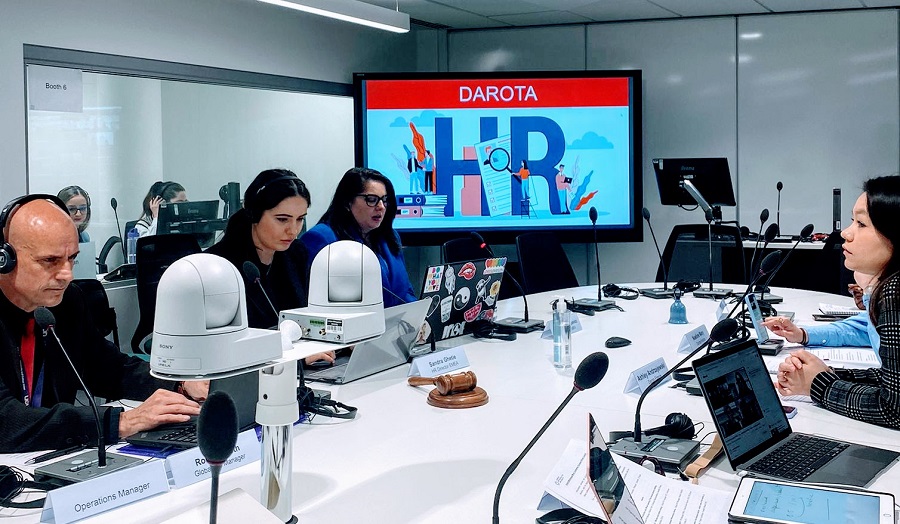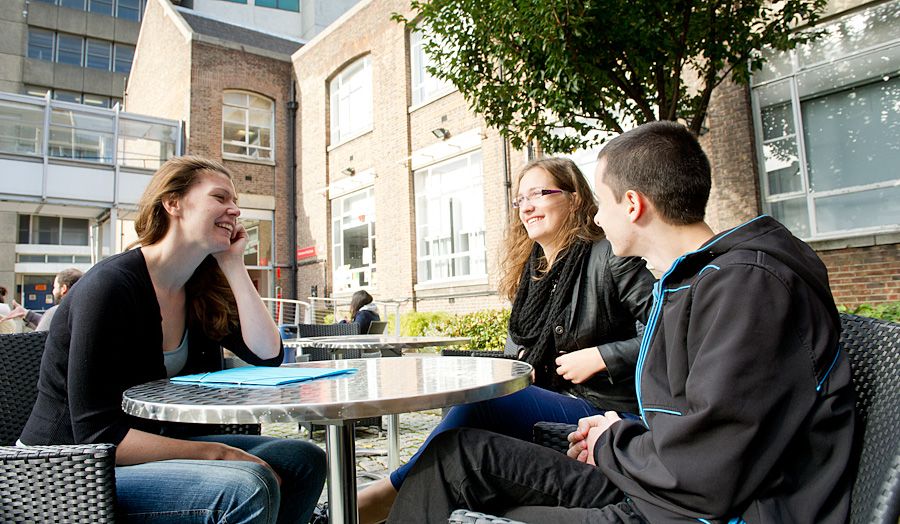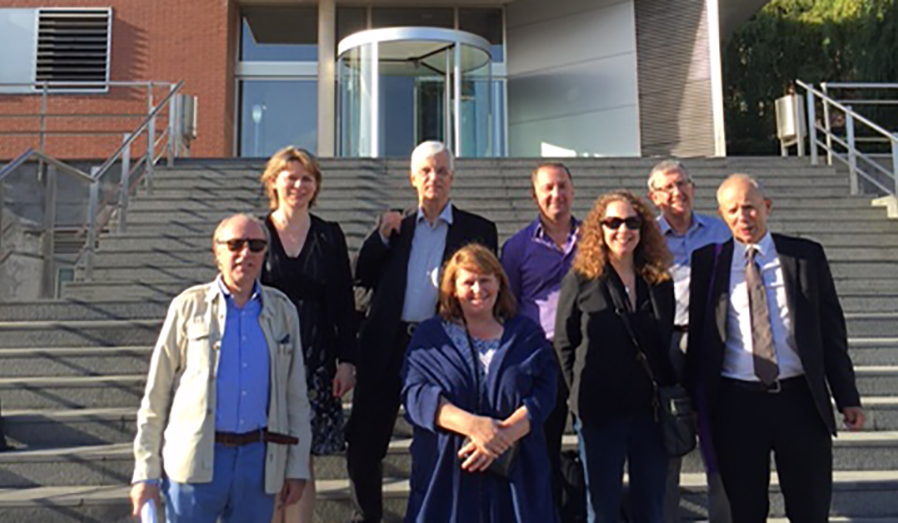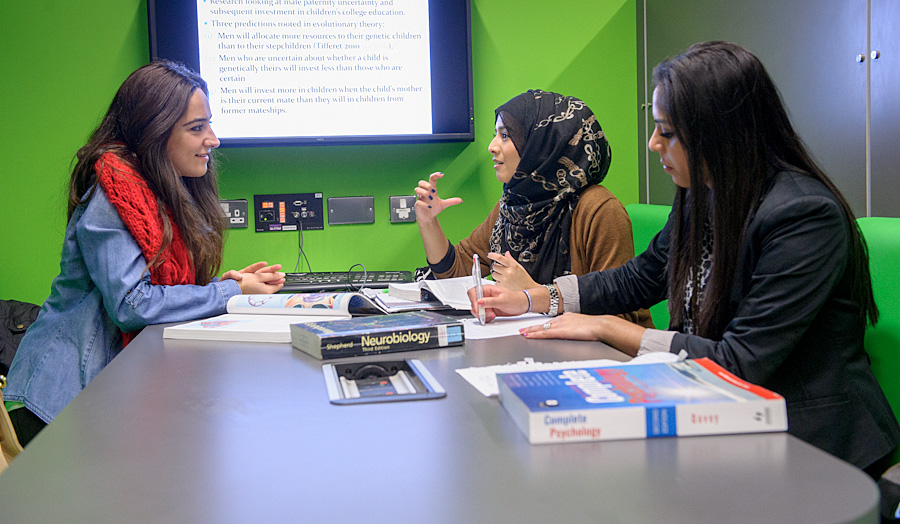Why study this course?
If you’ve already undertaken two years of a business management university degree or hold an equivalent qualification such as a Higher National Diploma (HND), then study this top up course to gain a bachelors degree.
Experienced business consultants will teach you the key qualities of international business management. This includes successful organisation across cultures, strategic choices in times of change and the operation of business unrestricted by national boarders. Our dedicated work placement unit can also help you find experience in a role of your choice.
We're also sixth in the country for producing the most CEOs and managing directors, according to a study by Hitachi Capital Invoice Finance.
Our business and management courses are ranked first for teaching quality in the Guardian University Guide 2023.
More about this course
This course is specially designed to help you top-up your foundation degree, Higher National Diploma (HND) or business subject equivalent. Over this one year period, you'll develop skills that will prepare you for a role in international business management.
The key areas you'll focus on includes organisation, strategy, international business and management. Depending on your preference, you could specialise in project management, international finance and trade, or even learn a new language – an incredibly useful skill when working as a manager in a multinational company.
You’ll be specially trained to manage business across cultures. As consultants the teaching staff on this course have improved competitiveness and productivity as well as bilingual business psychology. By combining business strategy with cross-cultural fluency, we've created a unique course that will help to give you an advantage against other graduates.
The Placements and Employability Unit is our dedicated work placement office that can help you get work experience in the roles you want. You'll build upon the academic skills you already know, and future employers will be impressed to see this experience on your CV.
Assessment
You are assessed through a variety of methods including coursework, portfolio work, problem-solving case studies and individual and group research projects, as well as a final dissertation or project. This range of assessment methods ensures you have a ready supply of thinking strategies to apply to any international business management issue.
Fees and key information
Apply nowEntry requirements
The course has been designed as a progression route for students who hold a Higher National Diploma (HND), foundation degree or equivalent in a business subject. You should have:
- 240 CATS (120 ECTS) equivalent for advanced entry to level 6
- GCSE English and Mathematics at grade C (grade 4 from 2017) or above (or equivalent)
Accreditation of Prior Learning
Any university-level qualifications or relevant experience you gain prior to starting university could count towards your course at London Met. Find out more about applying for Accreditation of Prior Learning (APL).
English language requirements
To study a degree at London Met, you must be able to demonstrate proficiency in the English language. If you require a Student visa (previously Tier 4) you may need to provide the results of a Secure English Language Test (SELT) such as Academic IELTS. This course requires you to meet our standard requirements.
If you need (or wish) to improve your English before starting your degree, the University offers a Pre-sessional Academic English course to help you build your confidence and reach the level of English you require.
Modular structure
The modules listed below are for the academic year 2023/24 and represent the course modules at this time. Modules and module details (including, but not limited to, location and time) are subject to change over time.
Year 3 modules include:
This final-year core module “Leading Innovation” aims to enable students to study and apply in practice:
a range of leadership theories and techniques to critically evaluate and develop their own personal leadership style
a range of leadership theories and techniques to critically evaluate contemporary innovation practice, and organisations in a range of industries engaged with innovation practice
a range of innovation theories and techniques to critically evaluate contemporary innovation processes, and organisations in a range of industries that innovate
the synergies between leadership and innovation in a range of contextsThe Module will be based around two themes:
(i) Theme 1: Leadership, where they will study, reflect on, and use leadership theories and techniques to assess and develop their own personal leadership style. By doing this, students will be closely engaging with and evaluating classic and contemporary theories, and directly applying the ideas from these theories to their own experience and ambitions.
(ii) Theme 2: Innovation, where they will study, analyse, and evaluate the innovation processes of selected organisations and industries (by critiquing, for example, Case Studies), and how innovation is achieved and operates within the contemporary economy (by critiquing, for example, classic and contemporary examples). In addition, students will study the synergies between leadership and innovation, an emerging area in academic research and in practice. By doing this, students will be closely engaging with and evaluating innovation practice and performance, informed by the leadership theories and techniques covered in Theme 1.Each theme will conclude with an assignment: Theme 1 will conclude with a team-based formative assignment, and Theme 2 will conclude with a pairs-based summative assignment. Once complete, this Module aims to enable students to understand a long-term timeline. Firstly, students will ‘look back’ and be exposed to classic and contemporary leadership texts, so they can critically evaluate and develop their own personal leadership style. Secondly, they will ‘look forward’ and critically evaluate how innovation can further emerge in the economy and society, and how contemporary and future organisations and industries can ensure sustainability through enhanced innovation, blended with enhanced organisational leadership.
This module explores a range of topics connected with working and managing across different social cultures. It examines cross-cultural management in both international and intra-national contexts, and draws on perspectives from social anthropology, social psychology, organisational behaviour and management theory.
One of the summative assessments, the group presentation, enables students to experience some of the challenges of working across cultures first hand. The work undertaken in this module in teams also addresses one of the course outcomes to which this module contributes and enables students to build valuable related skills.
The module is designed with weekly lectures followed by interactive seminar sessions. This design, together with the research for, and feedback from the presentations feed forward to the second assessment, the report. In producing individual analytical reports, students will develop analytical and evaluation skills relevant both to this module and to the related course pathways.
The content and design of the module underpin the broader objectives of the courses of which it is part. The content will substantially contribute to developing students’ understanding of management theories, models, frameworks, tasks and roles, and in particular implications for the management of people in international or cross-cultural contexts. The design and assessment frameworks reflect a student-centred learning approach, where students learn with and from each other, and where students progressively learn to discuss, debate and evaluate key organisational issues.
The content of this module reflects the socio-cultural breadth in our student body and staff, with over 140 nationalities represented on the campus (londonmet.ac.uk, 2020).
- This module currently runs:
- spring semester - Monday morning
- spring semester - Monday afternoon
- spring semester - Tuesday morning
- spring semester - Tuesday afternoon
- spring semester - Wednesday morning
- spring semester - Wednesday afternoon
This module builds upon the critical appraisal of the current global context in which businesses move operations and resources across the world. A critical review of recent trends in the world in which national borders are becoming tighter. Issues emerging from the growing economic interdependence worldwide – including long-term competitiveness and sustainable growth – which impact on business organisations are then examined focusing on the strategic and operational viewpoint. The assessment will consist of a consultancy simulation where students will work together on researching and presenting concrete examples of challenges faced by managers operating internationally. The research will focus on industries evolving and expanding into the world’s emerging markets. Students will be encouraged as much as it is possible to draw on knowledge and experience from their international peers to reflect on their learning experience and enhance employability.
This final-year core module “The Practice of Management” aims to enable students to:
- study and apply a range of management theories and techniques to critically evaluating their personal development and management style
- study and apply a range of management theories and techniques to critically analyse large PLCs, plus to wider global issues.The Module will be based around two themes:
(i) Theme 1: Personal and Academic Development, where they will study, reflect on, and use management theories and techniques to assess their own qualities and career ambitions. By doing this, students will be closely engaging with and evaluating classic and contemporary theorists, and directly applying the ideas from these theorists to their own experience.
(ii) Theme 2: Professional Development, where they will study, analyse, and evaluate the management and performance of large corporations, and, looking ahead, consider these corporations in light of the UN’s Global Sustainability Goals 2030, justifying ways in which their selected PLCs will need to be strategically re-aligned and managed internally in order to contribute to these long-term external goals. By doing this, students will be closely engaging with and evaluating management and business strategy and performance, and creatively re-designing corporate strategy to contribute to wider social, political, and cultural objectives.Each theme will conclude with an assignment: Theme 1 will conclude with an individual formative assignment, and Theme 2 will conclude with a pairs-based summative assignment. Once complete, this Module aims to enable students to understand a long-term time line. Firstly, students will ‘look back’ and be exposed to classic and contemporary texts, theories, and techniques, which they will apply to their personal and professional development. Secondly, they will ‘look forward’ and evaluate how contemporary PLCs can contribute to future wider global socio-political objectives, namely the UN’s Global Sustainability Goals 2030, which will strengthen their professional development.
The Professional Consultancy / Project is a capstone module in which students will be required to undertake a business project aimed at enhancing their employability as well as providing a platform for further professional development.
This module requires students to undertake and write up an individual project that gives them the opportunity to not only consolidate their learning on the programme, but also to clearly apply their learning in a real-world context. Furthermore, it will provide students with the opportunity to showcase their professional competences built throughout the programme.
If in employment students may choose to use a work-based consultancy project (subject to agreement from their employer). Alternatively, they may choose a project which is research-based.
Students will also be required to present their project via an on-line presentation or podcast. This module gives them the opportunity to demonstrate their professional credibility and to use their academic, business and technical skills in a professional context.
Professional Consultancy Project aims to:
1 Demonstrate the ability to utilise and contextualise knowledge by applying analytical skills to a business situation or problem
2 Demonstrate the ability to assemble a coherent and a sustained piece of writing that evaluates a business/project problem/solution
3 Create an opportunity to further develop a range of skills associated with research including analysis, interpretation, written expression, formal report writing, and self-managed study
4 Engage students on a complex, integrated activity that will consolidate and integrate previous skills and learning
5 Provide students with a ‘showcase’ opportunity that allows them to demonstrate their ability to apply the knowledge and skills acquired throughout the course to a significant and specialised taskThis module aims to enable students to complete a research focused dissertation on a chosen topic or issue appropriate to their undergraduate degree. Students are required to reflect on relevant research questions, theoretical concepts/hypotheses, prior literature, ethical approaches, research methodologies and data analyses in an independent and disciplined manner. Students are expected to develop an in-depth understanding of their chosen research topics, research methods/approaches and the ability to appropriately seek out data samples required for research in a selected topic. The module aims to develop analytical, critical thinking, referencing and time management skills in independently undertaking and reporting on a research project.
- This module currently runs:
- autumn semester - Friday morning
The module will consider a range of methods for evaluating communication and consider the theories of the main authorities in the field. The module will consider what is meant by “communication” and why a study of the subject is especially important for communication professionals.
The aim of the module is to engage students in critical and evaluative considerations using key theories, concepts; this will be through consideration and engaging with the language and discourse related to the subject area. Students will be introduced to the problems inherent in defining communication, and the different approaches to the topic. Students will also develop further the practical communication skills addressed in earlier modules. Current affairs will be a key feature in the module to illustrate the application of various theories and concepts
The module aims to assist in the building of the following specific skills:
• Critical thinking and writing
• Academic reading & academic writing and literacy
• Researching
• Analysing data & problem solving
• Commercial Awareness - This module currently runs:
- autumn semester - Monday afternoon
- autumn semester - Monday morning
This module enables students to acquire a systematic knowledge and understanding of the main theories, policies, issues and evidence in economic development with particular focus on emerging economies.
It develops students’ ability to apply economic principles and analysis in a variety of contexts in economic development and policy formulation.
It fosters an appreciation of the economic, social and political dimensions of development issues in an interdependent globalised world.
The module examines different perspectives on economic development and theories of economic growth and development. A range of sustainable development issues will be discussed: poverty, inequality, education, climate change, foreign aid, informal finance. Trade and comparative economic development in selected countries such as Russia, India and China are also examined.
It addresses gender inequality and inequality in terms of income, gender, access to education, health, finance, credit and employment.
Internationalisation is addressed when examining poverty, inequality, foreign aid, trade, climate change, environment and economic development of selected emerging economies.
Students are encouraged to reflect and draw on their diverse socio-cultural
backgrounds and experiences.Equality is promoted by treating everyone with equal dignity and worth, while also raising aspirations and supporting achievement for people with diverse requirements, entitlements and backgrounds
A range of transferrable and subject specific skills are developed, in particular: subject research; critical thinking; problem solving; written and oral communication; data and quantitative analysis.
Marketing is an essential component of any organisation regardless of size and has application globally, helping an organisation to retain and recruit news customers and increase the scale of a business.
Marketing is focused on the customer and the value of the product offering to stimulate demand, while sales activities are designed to encourage customer purchase. Both functions need to be integrated within an organisation to improve business performance.
Global marketing helps an organisation to find and develop new market opportunities while maintaining its domestic market(s.)
This module is intended to allow students to focus and explore the key components and nature of marketing and sales in a global market.
The global events of 2019 demonstrate the key linkages and interdependence of markets and demonstrate the importance of designing, distribution and selling products/ services in markets around the world, while maintaining a home market.
The module aims to:
- Provide an understanding of the role and importance of marketing and sales in a global setting.
- Explore a range of strategic choices available to organisations when seeking to expand globally.
- Provide an overview of marketing management in the ‘digital age’
- Explore the relationship and interdependence of marketing and sales
- Examine the impact of communication including digital applications to support product/service delivery in a global market.
- This module currently runs:
- spring semester - Tuesday afternoon
- spring semester - Thursday morning
The module aims to provide an in-depth understanding of theoretical and applied issues in relation to the activities of international banks. The module focuses on main theories of banking and provides an overview of the crucial operations in the context of international banking. It also seeks to provide students with a critical awareness of different approaches of assessing bank risk and performance and how they are used in practice by shareholders, investors and financial and banking experts.
- This module currently runs:
- autumn semester - Wednesday afternoon
This module introduces students to the fundamental aspects of the theories of international trade and finance, policy analysis and the controversies that surround these activities. It will examine the costs and benefits of these two fundamental activities in the global economy and consider the extent to which government policies in these areas can improve economic outcomes. The module will draw on up-to-date analyses and empirical studies and will examine theoretical and contemporary policy issues in this regard in the international economy.
The module also aims to develop a number of transferable skills of students, e.g. oral and written communication skills, research, quantitative, analytical and problem-solving skills.
- This module currently runs:
- autumn semester
Please check the Open Language Centre for confirmation of language level.
- This module currently runs:
- autumn semester
- spring semester
Please check the Open Language Centre for confirmation of language level.
- This module currently runs:
- spring semester - Wednesday afternoon
This module has been nationally promoted by the UK financial regulator the Financial Services Authority (FSA), [now Financial Conduct Authority (FCA)], as a ‘unique idea’ in their ‘National Strategy for Financial Capability in Higher Education’ (2009), and disseminated to all universities as an exemplar for raising student interest, expertise and enthusiasm in personal finance. FSA refers to London Metropolitan University as one of only four universities awarded the FSA Curriculum Development Grant for “unique ideas” put forward for the creation of a financial capability module, the unique idea for this University being the innovative Competency Based Action Learning (CoBAL) curriculum which is the outcome of doctoral level research conducted in collaboration with real-world organisations such as the National Institute of Adult Continuing Education (NIACE), the FSA, and the National Research and Development Centre for adult literacy and numeracy (NRDC).
The module underlines the role personal judgement plays in personal finance, and the many perspectives that inform personal judgement, enabling the student to formulate and employ Action Learning strategies for the development of knowledge, skill and attitudinal competencies in personal finance, and for increased ability and confidence in dealing with the complexities of making financial decisions in the five domains of financial capability identified by the FSA.
This is an Extension of Knowledge (EoK) module which any student on any course in the University is able to take as an option module subject to their course incorporating a relevant slot in their course structure. The module’s EOK status recognises the need for students of all subjects to have a good grasp of Personal Finance.
Strategy is a crucial subject, concerned with the development, success and failure of all kinds of organisations, from multinationals to entrepreneurial start-ups, from charities to government agencies, and many others. Accordingly, strategy constitutes a key element of all professional business and management qualifications.
It equips aspiring managers and leaders with the knowledge, skills and techniques required to critically analyse contemporary organisations within changing environments nationally and globally; to formulate, evaluate and defend realistic and creative proposals for future strategic direction; and to plan for the effective implementation of the strategy selected.Overall, the module aims to:
• Develop the knowledge and understanding to critically apply a range of practical strategic management tools for strategic analysis, choice-making and implementation across public, private and not-for-profit organisations of all sizes across all sectors;
• Enable students to translate their analysis of contemporary organisations and contexts into persuasive, creative and realistic proposals for an organisation’s future strategic direction;
• Enable students to apply structured insight into the realities of an organisation’s internal and external context in order to develop implementation plans which help maximise achievement of strategic objectives; and
• Enhance student employability by developing transferable skills such as research, analysis, evaluation, decision-making, presenting data and influencing others across different cultures, within both existing organisations and entrepreneurial start-ups.
What our students say
“I was anxious about the whole journey, but it proved to be a great decision that changed my life entirely. Soon after I started my first set of modules, I knew the styles and methods of teaching practiced by the lecturers suited my personal style - very practical and everything explained with real life examples. I made tons of great friends on London Met, and three of them later become my business partners.”
Ondrej Mrklas, Company Director of Czech Industry Company, 2015
“The course I’m doing has been extremely rewarding and greatly helped me to achieve my potential. The international aspects of the courses have been especially interesting.”
National Student Survey
Where this course can take you
This course can help you on your way to beginning your management career in multinational organisations, preparing you for entry onto a graduate training scheme. Many of our graduates now work in managerial roles for multinationals such as Zara and Thomson Reuters, and have even become directors of their own companies. For example, Ondrej Mrklas is in charge of the Czech Industry Company and heads up two more companies in China and Singapore with other London Met graduates.
Continuing your studies with us
The Guildhall School of Business and Law has a range of industry-linked postgraduate courses available on a full-time and part-time basis in business management, tourism and events, marketing and fashion, law, human resources and finance banking. These courses would be ideal for postgraduate progression:
- International Business Management with Project Management - MSc
- International Trade and Finance - MSc
- Marketing - MA
- Human Resource Management - MA
If you've already studied your undergraduate degree with us, as a graduate of London Met, you'll be entitled to a 20% discount on any further study with us.
Additional costs
Please note, in addition to the tuition fee there may be additional costs for things like equipment, materials, printing, textbooks, trips or professional body fees.
Additionally, there may be other activities that are not formally part of your course and not required to complete your course, but which you may find helpful (for example, optional field trips). The costs of these are additional to your tuition fee and the fees set out above and will be notified when the activity is being arranged.
How to apply
If you're a UK applicant wanting to study full-time starting in September, you must apply via UCAS unless otherwise specified. If you're an international applicant wanting to study full-time, you can choose to apply via UCAS or directly to the University.
If you're applying for part-time study, you should apply directly to the University. If you require a Student visa, please be aware that you will not be able to study as a part-time student at undergraduate level.
If you're applying for a degree starting in January/February, you can apply directly to the University.
When to apply
The University and Colleges Admissions Service (UCAS) accepts applications for full-time courses starting in September from one year before the start of the course. Our UCAS institution code is L68.
If you will be applying direct to the University you are advised to apply as early as possible as we will only be able to consider your application if there are places available on the course.
To find out when teaching for this degree will begin, as well as welcome week and any induction activities, view our academic term dates.












